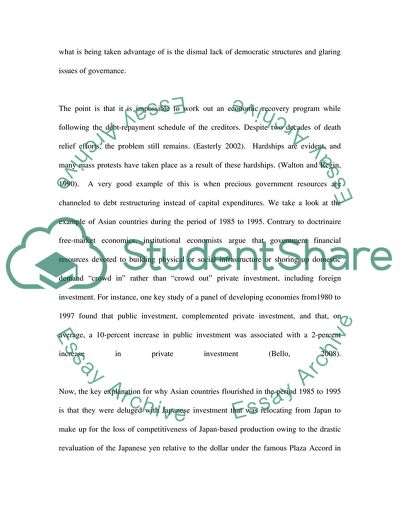Cite this document
(“The Jubilee Debt Campaign Essay Example | Topics and Well Written Essays - 1500 words”, n.d.)
The Jubilee Debt Campaign Essay Example | Topics and Well Written Essays - 1500 words. Retrieved from https://studentshare.org/politics/1546723-examine-the-validity-of-the-jubilee-debt-campaign-claim-that-much-of-the-debt-crisis-in-developing-countries-was-caused-by-reckless-or-self-interested-lending
The Jubilee Debt Campaign Essay Example | Topics and Well Written Essays - 1500 words. Retrieved from https://studentshare.org/politics/1546723-examine-the-validity-of-the-jubilee-debt-campaign-claim-that-much-of-the-debt-crisis-in-developing-countries-was-caused-by-reckless-or-self-interested-lending
(The Jubilee Debt Campaign Essay Example | Topics and Well Written Essays - 1500 Words)
The Jubilee Debt Campaign Essay Example | Topics and Well Written Essays - 1500 Words. https://studentshare.org/politics/1546723-examine-the-validity-of-the-jubilee-debt-campaign-claim-that-much-of-the-debt-crisis-in-developing-countries-was-caused-by-reckless-or-self-interested-lending.
The Jubilee Debt Campaign Essay Example | Topics and Well Written Essays - 1500 Words. https://studentshare.org/politics/1546723-examine-the-validity-of-the-jubilee-debt-campaign-claim-that-much-of-the-debt-crisis-in-developing-countries-was-caused-by-reckless-or-self-interested-lending.
“The Jubilee Debt Campaign Essay Example | Topics and Well Written Essays - 1500 Words”, n.d. https://studentshare.org/politics/1546723-examine-the-validity-of-the-jubilee-debt-campaign-claim-that-much-of-the-debt-crisis-in-developing-countries-was-caused-by-reckless-or-self-interested-lending.


